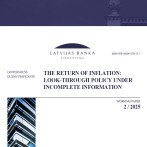The drop in consumer prices is slowing
According to the data of the Central Statistical Bureau, the consumer prices in June remained at the same level as in May, dropping 0.5% year-on-year, which rendered changes in the first six months negative on average (-0.6%).
The changes in consumer price level cancelled out within a month, with mainly several supply side factors interacting: the impact of changes in the prices of world resources (oil, agricultural goods) on inflation was upward, whereas seasonal factors in several groups of goods acted negatively. Service prices rose slightly, and mostly those with the tendency to fluctuate widely in previous months (air transport and package holidays ).
In May and June, a month-on-month rise was observed in average oil prices in the world market. It was not only reflected in the rise of fuel prices but also changed AS "Latvijas Gāze" (LG) vision of resource costs and thus also tariffs (in its latest projections LG envisions a rise in tariffs for the industrial consumers by one degree both in July and August).
Yet the current oil price trend has reversed itself: the referendum results in the United Kingdom on that country leaving the European Union (Brexit) are already having a negative impact on the assessment of demand in the oil market and prices have gone down slightly. The impact of Brexit on the Latvian economy, including price dynamic, would be expected to express itself more in the medium term and indirectly, by slowing economic activity.
The impact of seasonal factors on the monthly changes in prices in several groups of consumption differed from that observed in previous years, but in opposite directions (for instance, for fruits and vegetables), thus partially balancing out. The seasonally changing service prices also fluctuated differently from what was observed in previous years; for instance, the hotel service prices grew less and tourism and air transport service prices rose more rapidly, compensating for the drops experienced this year. At the same time, more than usual, prices dropped on some core inflation forming non-food consumer goods (for example, sports and recreation goods). Such price changes working in different directions overall do not point to an increase in the demand pressure on inflation.
From factors topical in the medium term, the slowing in the rate of wage rises, which in the first quarter of this year even exceeded what was expected, should be mentioned; thus the pressure of demand on prices will not increase in the coming months. The results of Brexit could also encourage uncertainty in consumer confidence and the tendency to form savings could even rise slightly. Thus an increase in the impact of demand on prices could be postponed for a somewhat more distant future.
The y-o-y inflation in the coming months can be expected to gradually climb above zero, but for now it will be mostly raised by the so-called technical factors (last year's trend of dropping prices in the second half of the year) and supply side factors (application of VAT basic rate to the services of housing management as well as the plans of some local government heating energy producers to raise heating tariffs). Yet in spite of the slowing in the rate of salary rises, the medium income level is also rising and influencing prices in some segments. It is not happening either by leaps and bounds or in an all-encompassing way as during the period of fast growth before the crisis, yet the evidence is that core inflation has stayed in the positive territory.
Textual error
«… …»






